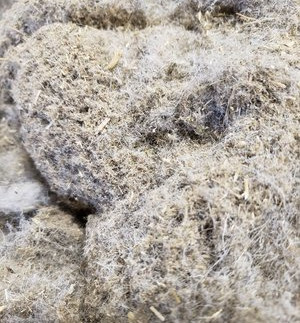Small Scale Wool Processing
- LaVonne Stucky

- Apr 9, 2022
- 3 min read
There are a few different types of fiber people in all aspects of the fiber world and processing is no exception. Most of it depends on how much you like the process. Admittedly, I have always sent my wool to the mill because I don't really enjoy the process. All of that changed when I bought the mill. I was already familiar with the process, having worked part-time with it, but as with anything you do, proper tools make the job at hand much easier.
I know people who absolutely love to do the entire process at home by hand and I know those who just want the end product after they drop the raw wool off at the mill. The spectrum of folks in between those two runs the gamut. There really is no right or wrong, just personal preference. I know without a mill, I don't want to process fiber and with a mill, many think it's, dare I say, a glamorous job. I can assure you it is not. The type of fleece and condition it comes to the mill in is as varied as the customers. Sometimes it's as easy as filling the wash bags and dropping them in the tank. Skirting is done just prior to this, so if the fleeces have not been skirted, that's primarily my job. I try to convey the monetary savings to customers if they skirt their own wool first. Some just don't care. They would rather pay to have it done. Sometimes folks just aren't sure how well to skirt, so they leave it up to me. Essentially, I tell people to remove anything you don't want next to your skin. Small VM (vegetable matter) will fall off during the carding.
Shearing day is the easiest time to skirt. Get all of the wet blobs, poopy and waxy blobs and large pieces of VM out then before it ever goes into a bag. A simple skirting table can be made with a turkey wire top to aid in this process. You just toss the fleece on the table and give it a few good shakes. Second cuts will fall off and some of the larger VM will too. A quick once over with your bare hands will help reveal larger debris like twigs, straw and burs and things like that. I can tell you; it makes my job much more pleasant here at the mill and will save you a bit of money too. All of these things add weight.
I am always amazed at the job the carder can do, but cleaning the carder is another matter. Sometimes I have to charge a cleaning fee for that based on the amount of larger debris left in the wool. Imagine a rolling pin with lots of pointy teeth rolling over a nice big bur. Now imagine plucking it back out of that rolling pin. Lanolin is another thing that adds weight to the wool. Although I love the lanolin on my skin and would actually prefer a little left in the wool after it's all said and done, the carder is just happier without it. It handles the wool better without lanolin and creates a nicer product. If the carder is happy, we're all happy.
Loss also happens with short fibers, weak tips and guard hairs. The carder will kick them off. When you add this all up, you can potentially realize 25 to 50% loss of your incoming weight. There are many variables, as you might imagine, but this is why you may only receive 25 lbs. of the 50 lbs. you brought in. I have actually read comments where people think the mill keeps part of their customer's wool. Well, in a sense we do, but it goes in the compost. Anything that comes off the carder goes to the compost bin. Beyond that, we do not keep any of your fiber. There are many types of scouring agents out there for you to choose from. We use citrus-based Eco Scour. All of the wash water goes back out onto the fields. Dawn dish soap is a common degreaser and frequently used for fiber. There are other commercial soaps on the market as well, but the issue we have with them is how scented they are. We really love the scent of wool and don't wish to have that aroma covered up. The scents can be problematic to some of us in the mill who are "scentsitive". As with a lot of things, less is more when it comes to added scent.
Processing isn't for everyone. If you love it, go for it. If you don't, support your local mill.
by LaVonne Stucky












Comments